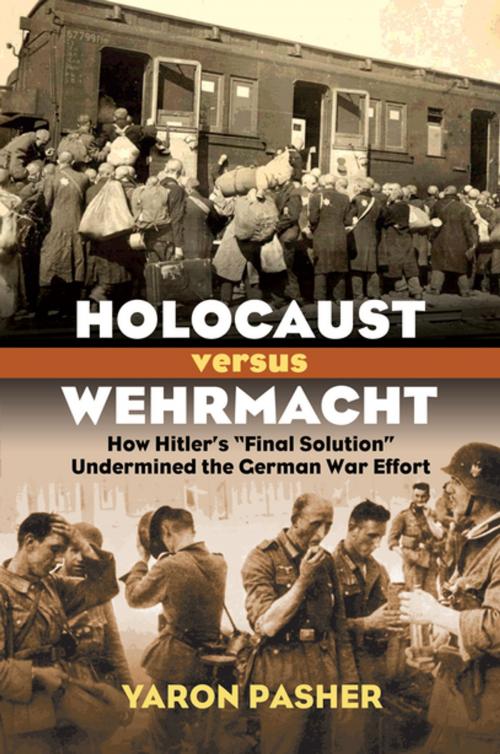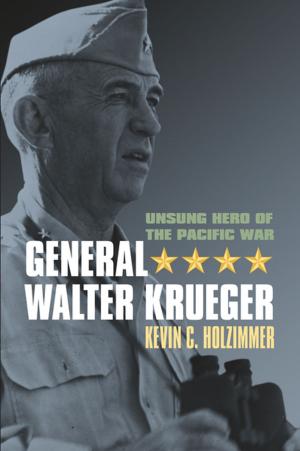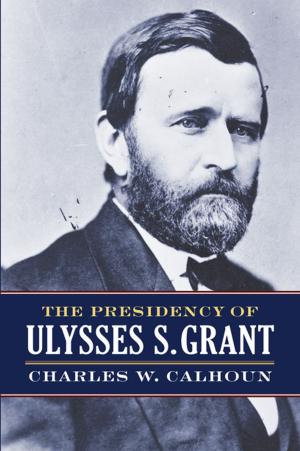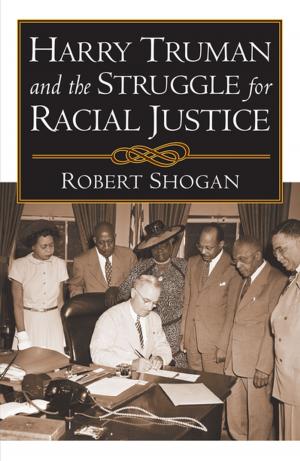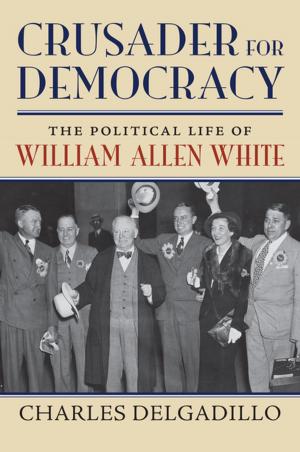Holocaust versus Wehrmacht
How Hitler's "Final Solution" Undermined the German War Effort
Nonfiction, History, Germany, Jewish, Military, World War II| Author: | Yaron Pasher | ISBN: | 9780700620371 |
| Publisher: | University Press of Kansas | Publication: | January 5, 2015 |
| Imprint: | University Press of Kansas | Language: | English |
| Author: | Yaron Pasher |
| ISBN: | 9780700620371 |
| Publisher: | University Press of Kansas |
| Publication: | January 5, 2015 |
| Imprint: | University Press of Kansas |
| Language: | English |
In 1941, as Nazi Germany began its disastrous campaign against the Soviet Union, Hitler's other campaign, to exterminate European Jewry, was also commencing in earnest. What began with organized executions carried out by the Einzatsgruppen evolved into systematic genocide, reaching its frenzied final moments just as the Wehrmacht was meeting defeat on the military front. These campaigns—and Germany's failure—were inextricably linked, Yaron Pasher tells us in Holocaust versus Wehrmacht. Pasher argues, in fact, that the major share of the logistical problems faced by the Wehrmacht during World War II stemmed from Hitler's obsession with securing the resources—especially from the Reichsbahn railway—needed to implement the "Final Solution." To a degree never fully recognized or understood, Hitler's anti-Semitic ideology was his war's undoing.
Through four major Wehrmacht military campaigns—Moscow, Stalingrad, and Kursk in the east and Normandy in the west—Pasher explores this fatal contradiction in Hitler's efforts to dominate the European continent. As Operation Typhoon, the sequel to the German invasion of the Soviet Union, got underway in November 1941, organized train transports began carrying Jews to the East—with the last trains taking Hungarian Jews to Auschwitz just as the Allies invaded Western Europe and moved inexorably to encircle the Third Reich. In these years, this book shows us, the trains transporting Jews could have carried men, machines, and fuel to depleted and trapped divisions in the Caucasus, and later, to the Western Front. As the Germans moved deeper into Soviet territory, they became increasingly dependent on train transport—which entailed converting Soviet railway line to German specifications; and yet, however successfully this conversion was completed, the trains that might run on these rails were working elsewhere in service of the Final Solution, leaving the Wehrmacht's overextended armies without the resources to survive, let alone win, their final battles.
In the end, what Hitler called "the Jewish problem" was his downfall. In documenting the distribution of Germany's resources and operational capabilities through four major campaigns, Holocaust versus Wehrmacht offers a clear picture of the Nazis' military objectives as inseparable from—and finally, fatally susceptible to—Hitler's and his henchmen's other, ideological war to rid Europe of Jews.
In 1941, as Nazi Germany began its disastrous campaign against the Soviet Union, Hitler's other campaign, to exterminate European Jewry, was also commencing in earnest. What began with organized executions carried out by the Einzatsgruppen evolved into systematic genocide, reaching its frenzied final moments just as the Wehrmacht was meeting defeat on the military front. These campaigns—and Germany's failure—were inextricably linked, Yaron Pasher tells us in Holocaust versus Wehrmacht. Pasher argues, in fact, that the major share of the logistical problems faced by the Wehrmacht during World War II stemmed from Hitler's obsession with securing the resources—especially from the Reichsbahn railway—needed to implement the "Final Solution." To a degree never fully recognized or understood, Hitler's anti-Semitic ideology was his war's undoing.
Through four major Wehrmacht military campaigns—Moscow, Stalingrad, and Kursk in the east and Normandy in the west—Pasher explores this fatal contradiction in Hitler's efforts to dominate the European continent. As Operation Typhoon, the sequel to the German invasion of the Soviet Union, got underway in November 1941, organized train transports began carrying Jews to the East—with the last trains taking Hungarian Jews to Auschwitz just as the Allies invaded Western Europe and moved inexorably to encircle the Third Reich. In these years, this book shows us, the trains transporting Jews could have carried men, machines, and fuel to depleted and trapped divisions in the Caucasus, and later, to the Western Front. As the Germans moved deeper into Soviet territory, they became increasingly dependent on train transport—which entailed converting Soviet railway line to German specifications; and yet, however successfully this conversion was completed, the trains that might run on these rails were working elsewhere in service of the Final Solution, leaving the Wehrmacht's overextended armies without the resources to survive, let alone win, their final battles.
In the end, what Hitler called "the Jewish problem" was his downfall. In documenting the distribution of Germany's resources and operational capabilities through four major campaigns, Holocaust versus Wehrmacht offers a clear picture of the Nazis' military objectives as inseparable from—and finally, fatally susceptible to—Hitler's and his henchmen's other, ideological war to rid Europe of Jews.
